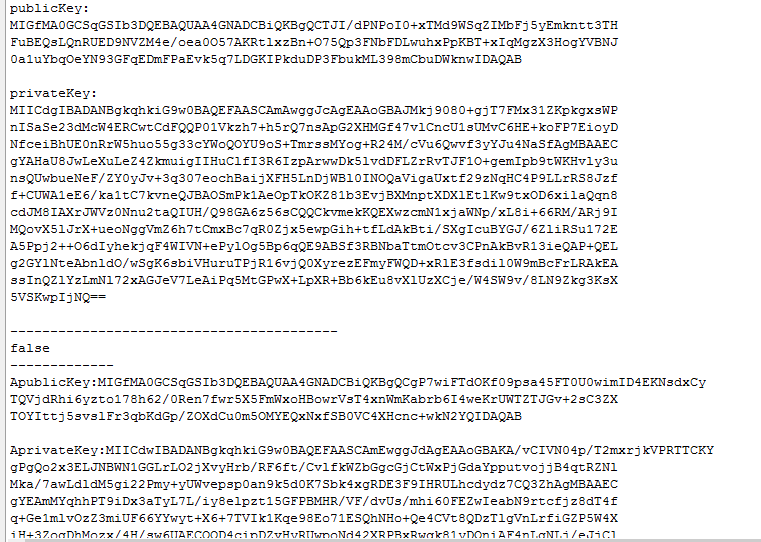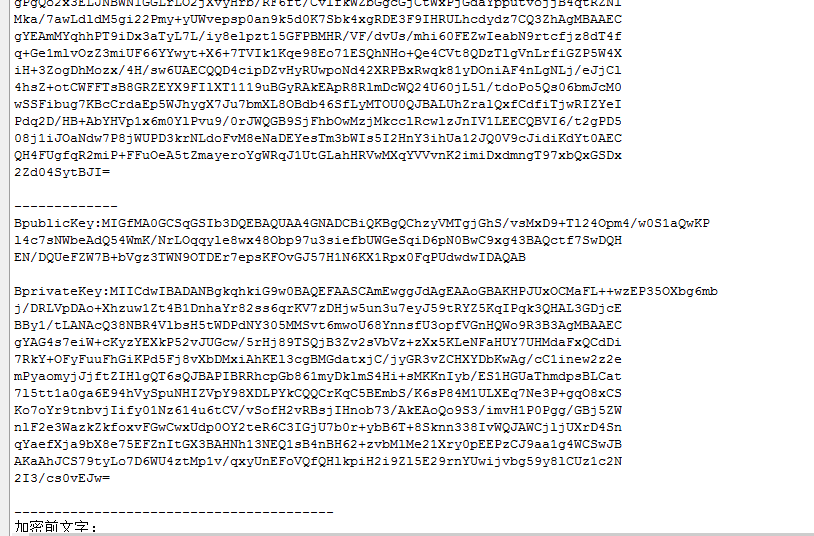RSA加密解密以后验签等操作笔记
RSA加密解密以后验签等操作笔记。留着方便自己方查找。
package com.xxx.test.utils;
import java.io.ByteArrayOutputStream;
import java.security.Key;
import java.security.KeyFactory;
import java.security.KeyPair;
import java.security.KeyPairGenerator;
import java.security.PrivateKey;
import java.security.PublicKey;
import java.security.Signature;
import java.security.interfaces.RSAPrivateKey;
import java.security.interfaces.RSAPublicKey;
import java.security.spec.PKCS8EncodedKeySpec;
import java.security.spec.X509EncodedKeySpec;
import java.util.ArrayList;
import java.util.HashMap;
import java.util.Map;
import javax.crypto.Cipher;
import sun.misc.BASE64Decoder;
import sun.misc.BASE64Encoder;
@SuppressWarnings("unused")
public class RSATest {
public static final String KEY_ALGORITHM = "RSA";
public static final String SIGNATURE_ALGORITHM = "MD5withRSA";
private static final String PUBLIC_KEY = "RSAPublicKey";
private static final String PRIVATE_KEY = "RSAPrivateKey";
/**
* RSA最大加密明文大小
*/
private static final int MAX_ENCRYPT_BLOCK = 117;
/**
* RSA最大解密密文大小
*/
private static final int MAX_DECRYPT_BLOCK = 128;
public static String getPublicKey(Map<String, Object> keyMap) throws Exception {
Key key = (Key) keyMap.get(PUBLIC_KEY);
byte[] publicKey = key.getEncoded();
return encryptBASE64(key.getEncoded());
}
public static String getPrivateKey(Map<String, Object> keyMap) throws Exception {
Key key = (Key) keyMap.get(PRIVATE_KEY);
byte[] privateKey = key.getEncoded();
return encryptBASE64(key.getEncoded());
}
public static byte[] decryptBASE64(String key) throws Exception {
return (new BASE64Decoder()).decodeBuffer(key);
}
public static String encryptBASE64(byte[] key) throws Exception {
return (new BASE64Encoder()).encodeBuffer(key);
}
public static Map<String, Object> initKey() throws Exception {
KeyPairGenerator keyPairGen = KeyPairGenerator.getInstance(KEY_ALGORITHM);
keyPairGen.initialize(1024);
KeyPair keyPair = keyPairGen.generateKeyPair();
RSAPublicKey publicKey = (RSAPublicKey) keyPair.getPublic();
RSAPrivateKey privateKey = (RSAPrivateKey) keyPair.getPrivate();
Map<String, Object> keyMap = new HashMap<String, Object>(2);
keyMap.put(PUBLIC_KEY, publicKey);
keyMap.put(PRIVATE_KEY, privateKey);
return keyMap;
}
/**
* <p>
* 用私钥对信息生成数字签名
* </p>
*
* @param data
* 已加密数据
* @param privateKey
* 私钥(BASE64编码)
*
* @return
* @throws Exception
*/
public static String sign(byte[] data, String privateKey) throws Exception {
byte[] keyBytes = (new BASE64Decoder()).decodeBuffer(privateKey);
PKCS8EncodedKeySpec pkcs8KeySpec = new PKCS8EncodedKeySpec(keyBytes);
KeyFactory keyFactory = KeyFactory.getInstance(KEY_ALGORITHM);
PrivateKey privateK = keyFactory.generatePrivate(pkcs8KeySpec);
Signature signature = Signature.getInstance(SIGNATURE_ALGORITHM);
signature.initSign(privateK);
signature.update(data);
return (new BASE64Encoder()).encode(signature.sign());
}
/**
* <p>
* 校验数字签名
* </p>
*
* @param data
* 已加密数据
* @param publicKey
* 公钥(BASE64编码)
* @param sign
* 数字签名
*
* @return
* @throws Exception
*
*/
public static boolean verify(byte[] data, String publicKey, String sign) throws Exception {
byte[] keyBytes = (new BASE64Decoder()).decodeBuffer(publicKey);
X509EncodedKeySpec keySpec = new X509EncodedKeySpec(keyBytes);
KeyFactory keyFactory = KeyFactory.getInstance(KEY_ALGORITHM);
PublicKey publicK = keyFactory.generatePublic(keySpec);
Signature signature = Signature.getInstance(SIGNATURE_ALGORITHM);
signature.initVerify(publicK);
signature.update(data);
return signature.verify((new BASE64Decoder()).decodeBuffer(sign));
}
/**
* <P>
* 私钥解密
* </p>
*
* @param encryptedData
* 已加密数据
* @param privateKey
* 私钥(BASE64编码)
* @return
* @throws Exception
*/
public static byte[] decryptByPrivateKey(byte[] encryptedData, String privateKey) throws Exception {
byte[] keyBytes = (new BASE64Decoder()).decodeBuffer(privateKey);
PKCS8EncodedKeySpec pkcs8KeySpec = new PKCS8EncodedKeySpec(keyBytes);
KeyFactory keyFactory = KeyFactory.getInstance(KEY_ALGORITHM);
Key privateK = keyFactory.generatePrivate(pkcs8KeySpec);
Cipher cipher = Cipher.getInstance(keyFactory.getAlgorithm());
cipher.init(Cipher.DECRYPT_MODE, privateK);
int inputLen = encryptedData.length;
ByteArrayOutputStream out = new ByteArrayOutputStream();
int offSet = 0;
byte[] cache;
int i = 0;
// 对数据分段解密
while (inputLen - offSet > 0) {
if (inputLen - offSet > MAX_DECRYPT_BLOCK) {
cache = cipher.doFinal(encryptedData, offSet, MAX_DECRYPT_BLOCK);
} else {
cache = cipher.doFinal(encryptedData, offSet, inputLen - offSet);
}
out.write(cache, 0, cache.length);
i++;
offSet = i * MAX_DECRYPT_BLOCK;
}
byte[] decryptedData = out.toByteArray();
out.close();
return decryptedData;
}
/**
* <p>
* 公钥解密
* </p>
*
* @param encryptedData
* 已加密数据
* @param publicKey
* 公钥(BASE64编码)
* @return
* @throws Exception
*/
public static byte[] decryptByPublicKey(byte[] encryptedData, String publicKey) throws Exception {
byte[] keyBytes = (new BASE64Decoder()).decodeBuffer(publicKey);
X509EncodedKeySpec x509KeySpec = new X509EncodedKeySpec(keyBytes);
KeyFactory keyFactory = KeyFactory.getInstance(KEY_ALGORITHM);
Key publicK = keyFactory.generatePublic(x509KeySpec);
Cipher cipher = Cipher.getInstance(keyFactory.getAlgorithm());
cipher.init(Cipher.DECRYPT_MODE, publicK);
int inputLen = encryptedData.length;
ByteArrayOutputStream out = new ByteArrayOutputStream();
int offSet = 0;
byte[] cache;
int i = 0;
// 对数据分段解密
while (inputLen - offSet > 0) {
if (inputLen - offSet > MAX_DECRYPT_BLOCK) {
cache = cipher.doFinal(encryptedData, offSet, MAX_DECRYPT_BLOCK);
} else {
cache = cipher.doFinal(encryptedData, offSet, inputLen - offSet);
}
out.write(cache, 0, cache.length);
i++;
offSet = i * MAX_DECRYPT_BLOCK;
}
byte[] decryptedData = out.toByteArray();
out.close();
return decryptedData;
}
/**
* <p>
* 公钥加密
* </p>
*
* @param data
* 源数据
* @param publicKey
* 公钥(BASE64编码)
* @return
* @throws Exception
*/
public static byte[] encryptByPublicKey(byte[] data, String publicKey) throws Exception {
byte[] keyBytes = (new BASE64Decoder()).decodeBuffer(publicKey);
X509EncodedKeySpec x509KeySpec = new X509EncodedKeySpec(keyBytes);
KeyFactory keyFactory = KeyFactory.getInstance(KEY_ALGORITHM);
Key publicK = keyFactory.generatePublic(x509KeySpec);
// 对数据加密
Cipher cipher = Cipher.getInstance(keyFactory.getAlgorithm());
cipher.init(Cipher.ENCRYPT_MODE, publicK);
int inputLen = data.length;
ByteArrayOutputStream out = new ByteArrayOutputStream();
int offSet = 0;
byte[] cache;
int i = 0;
// 对数据分段加密
while (inputLen - offSet > 0) {
if (inputLen - offSet > MAX_ENCRYPT_BLOCK) {
cache = cipher.doFinal(data, offSet, MAX_ENCRYPT_BLOCK);
} else {
cache = cipher.doFinal(data, offSet, inputLen - offSet);
}
out.write(cache, 0, cache.length);
i++;
offSet = i * MAX_ENCRYPT_BLOCK;
}
byte[] encryptedData = out.toByteArray();
out.close();
return encryptedData;
}
/**
* <p>
* 私钥加密
* </p>
*
* @param data
* 源数据
* @param privateKey
* 私钥(BASE64编码)
* @return
* @throws Exception
*/
public static byte[] encryptByPrivateKey(byte[] data, String privateKey) throws Exception {
byte[] keyBytes = (new BASE64Decoder()).decodeBuffer(privateKey);
PKCS8EncodedKeySpec pkcs8KeySpec = new PKCS8EncodedKeySpec(keyBytes);
KeyFactory keyFactory = KeyFactory.getInstance(KEY_ALGORITHM);
Key privateK = keyFactory.generatePrivate(pkcs8KeySpec);
Cipher cipher = Cipher.getInstance(keyFactory.getAlgorithm());
cipher.init(Cipher.ENCRYPT_MODE, privateK);
int inputLen = data.length;
ByteArrayOutputStream out = new ByteArrayOutputStream();
int offSet = 0;
byte[] cache;
int i = 0;
// 对数据分段加密
while (inputLen - offSet > 0) {
if (inputLen - offSet > MAX_ENCRYPT_BLOCK) {
cache = cipher.doFinal(data, offSet, MAX_ENCRYPT_BLOCK);
} else {
cache = cipher.doFinal(data, offSet, inputLen - offSet);
}
out.write(cache, 0, cache.length);
i++;
offSet = i * MAX_ENCRYPT_BLOCK;
}
byte[] encryptedData = out.toByteArray();
out.close();
return encryptedData;
}
public static void main(String[] args) {
Map<String, Object> keyMap;
try {
keyMap = initKey();
String publicKey = getPublicKey(keyMap);
System.out.println("publicKey: ");
System.out.println(publicKey);
String privateKey = getPrivateKey(keyMap);
System.out.println("privateKey: ");
System.out.println(privateKey);
} catch (Exception e) {
e.printStackTrace();
}
System.out.println("-----------------------------------------");
Map<String, Object> keyMapA;
Map<String, Object> keyMapB;
try {
keyMapA = initKey();
keyMapB = initKey();
System.out.println(keyMapA.equals(keyMapB));
String ApublicKey = getPublicKey(keyMapA);
String BpublicKey = getPublicKey(keyMapB);
String AprivateKey = getPrivateKey(keyMapA);
String BprivateKey = getPrivateKey(keyMapB);
System.out.println("-------------");
System.out.println("ApublicKey:" + ApublicKey);
System.out.println("AprivateKey:" + AprivateKey);
System.out.println("-------------");
System.out.println("BpublicKey:" + BpublicKey);
System.out.println("BprivateKey:" + BprivateKey);
System.out.println("----------------------------------------");
String source1 = "这个表要要加密的内容,我们现在开始处理。";
System.out.println("加密前文字:\n" + source1);
byte[] data1 = source1.getBytes();
byte[] encodedData1 = encryptByPublicKey(data1, ApublicKey);
System.out.println("加密后文字:\n" + new String(encodedData1));
byte[] decodedData1 = decryptByPrivateKey(encodedData1, AprivateKey);
String target1 = new String(decodedData1);
System.out.println("解密后文字: \n" + target1);
String source2 = "这个表要要加密的内容,我们现在开始处理,用B的私钥进行加密,然后得取字符串,发给A,A收到加密字符串后,利用B的公钥进行解密。";
System.out.println("原文字:\n" + source2);
byte[] data2 = source2.getBytes();
byte[] encodedData2 = encryptByPrivateKey(data2, BprivateKey);
System.out.println("加密后:\n" + new String(encodedData2));
byte[] decodedData2 = decryptByPublicKey(encodedData2, BpublicKey);
String target2 = new String(decodedData2);
System.out.println("解密后: \n" + target2);
System.out.println("私钥签名——公钥验证签名");
String sign2 = sign(encodedData2, BprivateKey);
System.out.println("签名: \n" + sign2);
boolean status2 = verify(encodedData2, BpublicKey, sign2);
System.out.println("验证结果: \n" + status2);
} catch (Exception e) {
e.printStackTrace();
}
}
}
执行结果如下:
这个就把RSA的常规使用放在这里方便以后查找。


